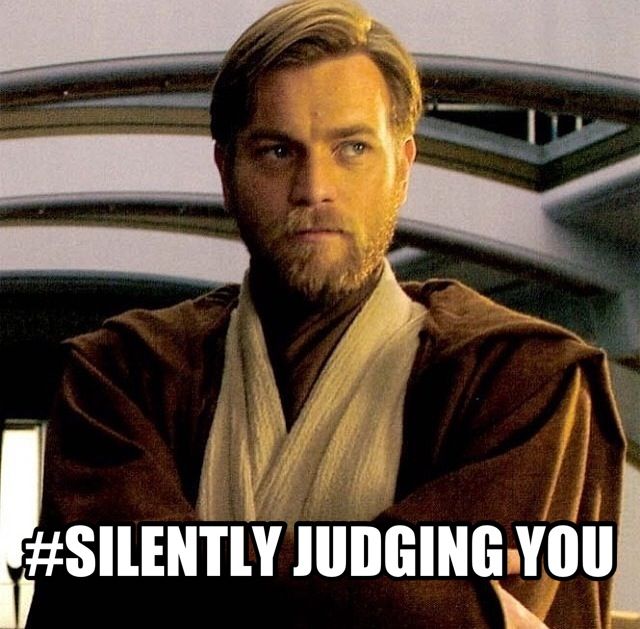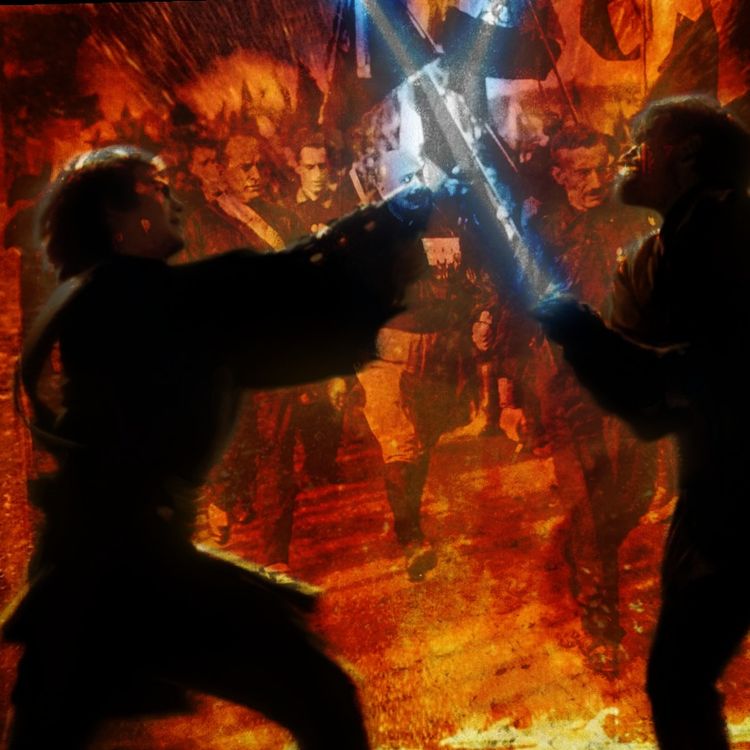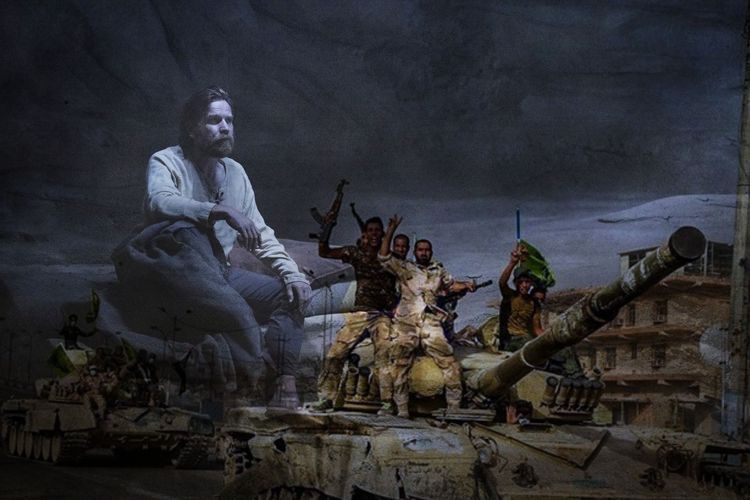Decline and Fall Free: The Very Model of a Modern Jedi Master

Hello there! Decline and Fall, our series of big features on Star Wars, returns with the first of a two-part entry on the one prequel that most people actually liked: Revenge of the Sith.
Revenge is an extremely dense film, and we found quite a lot to talk about here, including conversations around what precisely constitutes political legitimacy, the souring war in Iraq, the role of magic in our story, and the kind of deep character readings you come to Heat Death for. Paid subscribers can access the whole 10,000 word entry,
In this free excerpt, we zero in on the failures of two particular institutions: the Galactic Senate and the Jedi Council, with particular attention paid to that consumate Jedi Obi-Wan Kenobi. He's a lot more complicated than you might remember...
Let’s consider how matters currently stand in the Galactic Republic, after three years of punishing war. With the planets most dissatisfied with the crumbling Republic helpfully split away in the Separatist bloc, the loyalist systems are exhausted, battle-scarred, and clinging to the state more tightly than ever.
As long as the crisis lasts, Palpatine stands as the legal chief executive of the Senate, the theoretical governing body of this interstellar union. He enjoys significant majority support in the legislature. And he’s making direct moves to shore up his power, largely though appointing his own officials at every possible level.
Elements within the Senate have finally noticed. For what follows, we must turn to a pair of rather crucial scenes that Lucas filmed but ultimately cut from the film’s theatrical release.
In them, an informal meeting of senators convenes in the office of Bail Organa (Jimmy Smits, the picture of genteel, slightly absent liberalism). Organa is the senator and prince-consort to the queen of planet Alderaan. Among the others present are the sweet-faced senator from Chandrilla, Mon Mothma (Genevieve Reilly, a genius bit of casting that will take almost two decades to pay off) and Amidala, one-time elected queen of Naboo, and now the planet’s designated Senator.
It’s worth taking a moment to consider the people in this room. For one thing, most of them are coded as fairly elite power players in Coruscant’s high society. The planets they represent — places like Alderaan, Chandrilla, even to an extent Naboo — are comfortably Republican, and clearly quite wealthy in comparison to the hardscrabble systems on the Outer Rim.
And notably, all of them are human.
On one level, that’s natural: for all its pretensions to belonging to a galaxy filled with a multitude of other peoples, Star Wars is a story constructed by, for and largely about humans. But it bears mentioning, nonetheless — the burgeoning elite opposition to Palpatine is coming from his own species, and more pointedly, his own social set.
The mood in the room is grim. Palpatine has been pushing through constitutional amendments more or less at will, Organa tells the group, such as the appointment of governors — presumably, military governors, given the ongoing war — to oversee all star systems in the Republic. All of these changes are obviously an attempt to sideline the Galactic Senate itself.
Organa builds the thought out to its obvious conclusion. “We cannot let a thousand years worth of democracy disappear… without a fight.”
The moment hangs heavy in the room. “What are you suggesting?” an unnamed senator asks.
“I’m not trying to sound like a Separatist,” Organa hastens to say. Mothma concurs: they are loyalists, trying to preserve democracy within the Republic.
Of course, the democracy the people in this room espouse is, in practice, synonymous with their own power. The Senate that has never actually seemed all that democratic when it comes to the day to day citizens of the Republic. Mothma admits as much: a sizable majority of the body — those more venal, clearer eyed, or with a finger/claw/digit to the wind — doesn’t really mind trading governing authority for something more cushy and ceremonial.
Mothma is correct to call this corruption, but it’s the kind of corruption you find on a corpse: a process of devouring, digestion and state change. In Rome, the sidelining of the Senate into a ceremonial country club was a key and largely consensual feature of the state’s transition into autocratic rule. (The occasional spasms of violence after that transition, particularly the assassination of Caligula, were prompted in part by those prickly aristocrats insisting on social respect, not by serious attempts to reassert full senatorial authority.)
At this point, regardless of what the "loyalist" senators claim, the deliberative processes they espouse have broken down beyond repair. Organa and Mothma, at least, seem to have belatedly woken up to this fact. “We cannot continue debating about this," the Senator from Alderaan snaps, before revealing that he and Mothma are putting together an organization. A secret one.
By unspoken agreement, the precise nature of this organization goes unsaid. It does not need to be said. Everyone in the room knows what they are talking about.
This is a pretty crucial development! Whatever else you can say about Palpatine, he’s been acting within the confines of the law — glorying in the loopholes and institutional blind spots that should have kept someone like him out. (A useful reminder, perhaps, that there is a world of difference between what is legal, what is traditional, and what is right.) By contrast, the approach that these senators are carefully not discussing is therefore something both illegal and radical, however necessary: the funding of organized resistance to the current, legally elected regime. A coup — or a revolt.
Rebellions are seldom born in any particular moment or place: they are instead shaped by a multitude of different factions, from street-fighters to organizers to elites with scores to settle. Here, in this room, among these rich senators, one such seed of rebellion has been planted, by people whose vision of liberty may not accord well with ours.
The other notable thing? Organa and Mon Mothma insist — and pretty much everyone else in the room agrees, including a visibly conflicted Amidala — that the Jedi Order not be looped in. The Chancellor, they believe, has control of that particular order, and thus the “Guardians of the Republic” cannot be trusted to back up the senators’ nascent plot.
This is a fair concern – The Jedi Order have been enthusiastic participants in the war. They serve as generals of the clone battalions and are thoroughly integrated into the Republic’s military command, which exists largely under Palpatine’s personal direction. But in a bit of tragic irony, the Jedi Council, among them Chairman Mace Windu and Master Yoda, are also — separately — beginning to have serious doubts about the Republic’s current state, along the same lines as the Senate conspiracy.
Jedi throughout this trilogy have tended to speak dismissively of Politics, i.e, that rather distasteful thing that the Senate does. Perhaps at one point this was wise: staying out of high-level politics makes sense for an itinerant order of diplomatic warrior monks, interested primarily in being seen as the impartial arbiters and guardians of the local citizenry.
Indeed, as the Republic expanded through the Galaxy and the Senate waxed in strength, the Jedi have maintained a sort of studied neutrality in the face of day-to-day factional struggles — a posture that for centuries has likely been the safest bet for the Order’s future.
But at some point in the past, the Jedi Order settled in the capital, and slowly grew enmeshed in the Senate’s business — while steadfastly denying that any such thing had happened, and refusing to learn or develop the skills to do it well. As the Senate began its slow decay, the Jedi Order also failed to pick up the slack. Assuming, that is, they even acknowledged any slack to begin with. (This has to be seen as deliberate policy from figures we’re accustomed to seeing as heroes: the sagacious Master Yoda, after all, has been a guiding hand of the Order for centuries.)
Now, the Jedi Order is in a singularly tricky situation: having long ago been coopted, they are now realizing they’ve been coopted — and have to figure out how to extricate themselves. Their working plan? Cooperate with the Chancellor for now, then use the defeat of the Separatists to push Palpatine to give up the emergency powers he’s accumulated. This is less a developed scheme than an intention. More than anything else, it is suggestive of a larger atmosphere of crisis: even these steadfast, institutionalist servants of the Republic are finally beginning to ask serious questions about the state’s future, and whether they should take a hand in it.
Palpatine, however, is already in motion. Shortly after Skywalker’s meeting with Yoda, the young Jedi is summoned into the Chancellor’s office. There, Palpatine warmly informs him that henceforth, he’ll be serving as Palpatine’s appointed representative on the Jedi Council. His duty will be to serve as the “eyes, ears, and voice” of the Republic. (A neat bit of business, this: it neatly implies that the interests of the Jedi Council are distinct from, and perhaps opposed to, the Republic it serves.)
Palpatine neatly brushes aside Skywalker’s protests that the Council won’t accept such an outside appointment — he knows knows that they will. Moreover, he understands that rubbing the Council's noses in the fact that they have to accept it— they’re too deeply enveloped in the Republic’s military to easily deny it — means that they’re likely to react very badly.
It’s an expert provocation, and the Jedi Council rises to it with an ineptitude staggering for a cabal of self-described spiritual warriors. True to Palpatine’s expectations, they allow Skywalker onto the Council. But out of either pique, institutional pride, or an attempt to maintain some (long vanished) independence, the Council outright refuses to grant him the rank of Master. In a singularly ill-advised move, Master Windu curbs his protests by calling him “young Skywalker” and ordering him to take a seat.
There, Skywalker sits and stews while the Masters discuss the ongoing war.
Here is one of this story’s many off-ramps from disaster. Imagine, for a moment, that the Council had played this differently. Imagine if they’d gritted their teeth and spoken as softly and warmly to Skywalker as Palpatine does. If they had swallowed their doubts and approved his appointment as master, and done their best to reaffirm his place in the order. They could have sent him happily on his way, partially suborned by the group to which he, after all, owes the most, and to whom he is most loyal.
They could, in a word, have practiced some politics. Had these arrogant monks done so, then perhaps their next move would not have been so disastrous.
Instead, as a freshly-humiliated Skywalker leaves the Council meeting, the Jedi Masters double down on their mistake. They send Kenobi — a friendly face, ostensibly — out to talk to him.
Throughout this trilogy — not to mention the original trilogy to which it serves as backstory — Kenobi has been presented to us as the consummate Jedi. Now, then, seems like a good moment to consider the man in more detail.
His backstory is easily sketched out: he’s grown up in the Jedi Order since early childhood, making the order the only family he’s ever known. He lost his master too young, was knighted too young, and took on guardianship of his master’s other apprentice/Messianic pet project too young, as well.
Kenobi's reaction to this sudden influx of responsibility? Striving to become the very model of a modern Jedi Master.
By Revenge of the Sith, Kenobi is a man of genuinely admirable qualities. Urbane, courtly, and cautious, Kenobi is also something of a Jedi of the world: consider his odd friendship with freelance adventurer/diner owner Dexter in Attack of the Clones. He can think on his feet, has good investigative instincts, and is willing to ask awkward questions. While a trained and ruthless killer, he is also sober and restrained. Though an accomplished swordsman and decent pilot, he lacks the thrill-seeking urge — and, let’s be honest, battle-lust — displayed by Skywalker. Most of all, he has a keen sense of duty to both his institution and his state, and he discharges his obligations to both to the best of his considerable ability.
Also to Kenobi’s credit, he’s not utterly hidebound: it’s implied (and the shooting script confirms) that he knows Skywalker and Amidala have a relationship, and he doesn’t seem to care. The Lucas-produced Clone Wars show will shade this in: Kenobi has had his own flirtations with leaving the order for a woman, though he ultimately held to his vows.
But if Kenobi’s virtues reflect well on the Jedi Order, his flaws likewise embody its broader weaknesses. Apprenticed to a famously unorthodox teacher, he seems to have rebelled in turn by clinging to orthodoxy. He eschews "politics" as a matter of reflex, and refuses — as if on principle — to develop any skills at it. Indeed, Kenobi can be stunningly bad at navigating any conversation where strong emotions are present. (In a funny moment earlier in the film, Grievous sarcastically calls him "the negotiator," in tones that make it clear what he thinks of Kenobi's abilities in this arena.) His superficial friendliness masks a fundamental emotional distance.
Therefore it’s with Skywalker — former apprentice, friend, and emotional volcano — that his greatest flaws become apparent.
Rather like his onetime pupil, Kenobi seems to be battling down a bone-deep terror, repressed and hidden for so long that he is no longer aware of it; as though he can hold the collapsing Republic together with good manners and merciless self-control. His occasional attempts to offer Skywalker guidance therefore lack his former master’s warmth. Instead of genuine support, Kenobi tends to default to a customary blend of benign neglect and patronizing scolding. Does he love Anakin, in some brotherly way? Probably. But it never really seems like Kenobi sees Skywalker —or even that he particularly bothers to look.
It's Kenobi's curse in this movie that he consistently is the voice of reason in the most off-putting way possible — a Jedi Cassandra doomed to deliver good advice in the perfect packaging to make his friend reject it.
And just as the Skywalker's inner darkness gives him the starring role in the tragedy to follow — so too must a hefty pile of blame rest on his former master's shoulders.
Let's go back to where we left Skywalker: humiliated, angry and frightened, stalking away from the Council meeting. Behind him comes his old friend Kenobi, trying to reel him back in.
At first, the older Jedi takes a genuine stab at comforting his friend, pointing out that a man his age being on the Council in any capacity is a great honor. But, being Kenobi, he can’t resist a high-handed comment: “The fact of the matter is you are too close to the chancellor. The Council doesn't like it when he interferes in Jedi affairs."
“I swear to you, I didn't ask to be put on the Council,” a clearly embarrassed Skywalker replies.
“But it's what you wanted,” Kenobi shoots back, with the poisonous irritation of something he has waited too long to say. “Your friendship with Chancellor Palpatine seems to have paid off.”
Then, having simultaneously insulted his friend — and reminding him what he owes Palpatine — Kenobi gets down to brass tacks. The Council had an ulterior motive for approving Skywalker’s appointment, he explains: since Palpatine trusts the young Jedi, they want him to report back to them on the Chancellor’s dealings.
Skywalker is visibly shocked. “They want me to spy on the Chancellor? But that's treason… why didn’t the Council give me this assignment when we were in session?”
Kenobi has the grace to look uncomfortable. “This assignment is not to be on record.” Moreover, he hastens to explain, the Jedi owe allegiance to the Senate, not its leader—particularly not a leader who’s managed to extend his own power, legally or not. His voice takes on an urgent tone, the old panic taking hold. “Use your feelings, Anakin. Something is out of place—”
This is too much for Skywalker. He points out that Palpatine has been nothing but a supportive friend since his arrival on Coruscant as a boy. “You're asking me to do something against the Jedi code,” he spits. “Against the Republic. Against a mentor and a friend. That's what's out of place here.”
That night, a troubled Skywalker tries — in his customarily blunt and fumbling way — to express his fears to Amidala. He clearly hasn’t told her about the Council's orders. But at last, he can smell the rot on the wind, and hear the grinding in once-oiled gears. “Sometimes I wonder what's happening to the Jedi order,” he tells his wife. “I think the war is destroying the principles of the Republic.”
Music to Amidala’s ears! Amidala, recall, is the former elected queen of Naboo’s (human) society, and a Galactic Senator. She’s a more flawed and interesting figure than she initially seems: as institutionalist in her way as Kenobi, as impetuous as Skywalker. Despite her love for the Senate, she’s already responsible twice over for handing it to Palpatine. Despite her attempts to prevent the Galactic Civil War, she played a key role in kicking off its first battle. Amidala is, in many ways, Star Wars’ Good Liberal: she sees the decay of her state, but cannot quite fathom any role for herself in how it came to pass. Yet the ensuing years of warfare have only strengthened her conviction that the Republic is on the wrong course, and her decision to try and do something about it.
Revenge of the Sith doesn’t give us much of this, alas. In fact, the film sidelines Amidala quite badly, compared to its predecessors: the psychosocial struggle between Kenobi, Skywalker and Palpatine squeezes her out of the frame almost entirely. Even her appearances in deleted scenes— where, recall, Amidala is party to the Senate conspiracy to thwart Palpatine — depict her as hapless and distressed.
Knowing that Amidala is making subversive offscreen moves of her own, however, gives the following exchange an interesting charge. “Have you ever considered that we may be on the wrong side?” she says, carefully broaching the subject. “What if the democracy we thought we were serving no longer exists... and the Republic has become the very evil we've been fighting to destroy?”
No sell. Skywalker stares at her. “I don't believe that. And you're sounding like a Separatist.”
Amidala forges on. “You're closer to the chancellor than anyone. Please, ask him to stop the fighting and let diplomacy resume.”
“Don’t ask me to do that!” Skywalker snaps. “Make a motion in the Senate, where that kind of a request belongs.”
Too late, Amidala seems to realize she’s stepped on a nerve. But when she asks what’s wrong, Skywalker stonewalls her. In the shooting script, the two lovers finally defuse the moment by wryly acknowledging each has things they aren’t telling the other. But in the film itself, the moment just lingers, sickening, even as Amidala asks Skywalker just to hold her.
Skywalker’s problem here — which he appears agonizingly aware of — is that he’s a blunt instrument, and knows it. Subterfuge and divided loyalties? Uncertainty? Not his thing. He’s a man who favors the simple, direct, and preferably violent action of wartime.
Yet immediately upon his triumphant return to Coruscant, he finds the three people who matter most in his life — Palpatine, Amidala and Kenobi — each trying to maneuver him into being some combination of confidant, go-between and spy, It’s a role he’s desperately unsuited for and flatly doesn’t want. Out of those three people, there is only one he wholly trusts.
Unfortunately, that’s Palpatine.
To read the rest of the feature and follow subsequent entries in Decline and Fall, you can grab a paid subscription right here. (It'll also get you access to other paywalled articles and our soon-to-launch Discord community.) Join us!






Member discussion